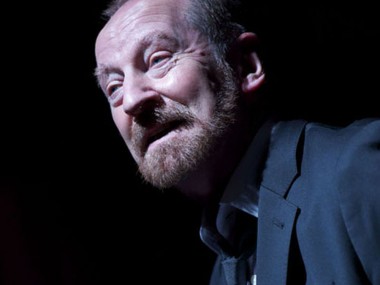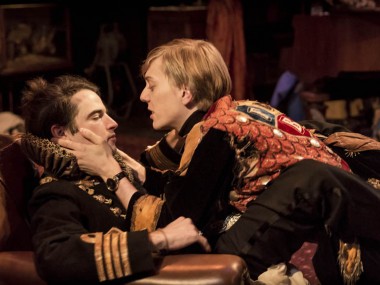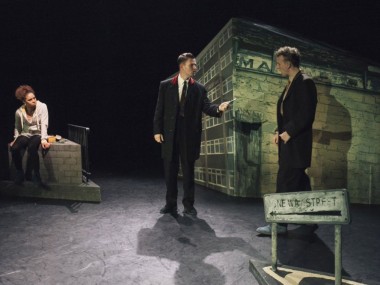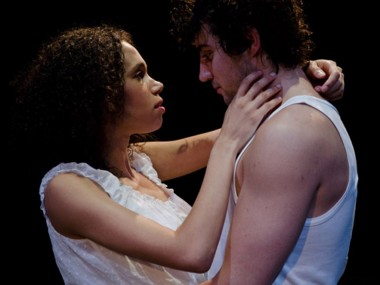The Trials, Donmar Warehouse
Tuesday 16th August 2022
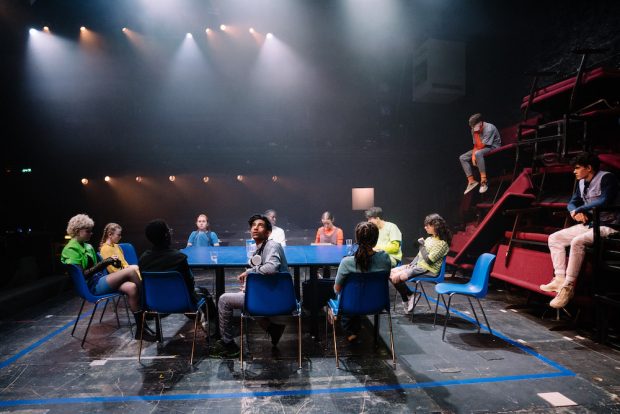
Dystopian theatre takes many forms — but this is the first to be a jury-room drama. Dawn King has previously explored the world of double-think and the use of fear and fake news by oppressive regimes in her 2011 drama, Foxfinder, and now turns her attention to climate change litigation. With a twist. In The Trials, a jury of young people must deliver verdicts on the role of older individuals in contributing to the climate change. Since an overheating world is of burning interest to many young people, this Donmar Warehouse production is part of project involving schools and community in the process of creating this excellent piece — and many of the actors are making their stage debuts.
Set in the near future, after climate change has devasted the world and killed millions, the background to The Trials is a revolution which has to cope with the effects of the catastrophe. Since the world is overpopulated, and there are not enough resources to keep everybody alive, an older generation is being judged and the guilty ones are condemned to “euthanasia”. Executed. So far the most privileged and powerful have been eliminated, and now the more ordinary people — company executives, bureaucrats and, um, artists — are being judged on their personal contribution to global warming.
King’s chilling play shows us the personal statements of three defendants, followed by jury-room discussions of twelve youngsters. While members of the older generation like Defendant One (played by Nigel Lindsay) say all of the things that have become clichés — I recycled; I tried to eat less meat; I limited the amount of flights I took; I bought an electric car — the jurors are split between compassion and vengefulness. With some bored, and others confused or upset by the process — they are, after all, condemning people to death. An event which is open to spectators and televised. Children can watch their parents being executed.
The accusers are led by the fanatical Gabi, whose family was too poor to have a large carbon footprint and are immune to prosecution, and 16-year-old Noah, a confident boy who is told off for swearing and is attracted to non-binary Chris, while habitual defenders are led by the rationalist Mohammad. The characters and backgrounds of the more undecided jurors, whose chair is Ren, a tree planter, are sketched out: Kako, whose parents were executed because they were lawyers, Amelia, sick with anxiety, Xander, a member of the Climate Defence Force who pick up the bodies of those killed by floods and other disasters, and Adnan, who suffers badly from asthma.
One of the most eye-catching jurors is Tomaz, who affects a languid disinterest but is also transgressive: against the rules, he opens the window and lets pollution in; he also injects theatrical energy into the proceedings by creating a fantasy vision of snow falling and imagining the experience of flying by playacting. As the teens discuss the cases of their “dinosaur” elders, they briefly debate the nature of justice (they only have 15 minutes to come to a conclusion for each case), individual responsibility (several are clearly unable to reach a reasonable verdict) and how their personal experiences affect the verdicts.
Like adult juries, but under greater stress because of the dictatorial nature of the process (democracy has been abandoned because it failed to stop disastrous climate change), this jury is affected by strong personalities and bold statements. As you’d expect from teens, there is a certain formality (they include preferred pronouns when they introduce themselves), a sense of seriousness grappling with a need to clown around, currents of desire, and some general angst. Also anger, antagonism and idealism. It feels like a very British version of the Chinese Cultural Revolution, although what’s missing is any vision of what this new world is really like.
King’s text is both convincing and urgent. Clearly, many younger people must be angry about the increasingly obvious climate emergency, especially as this show opens at a time of record temperatures and drought in London, and blaming previous generations is understandable. At first the play seems to be rather predictable and formulaic, but then King subverts her own formula and delivers a highly emotional plot twist which gives punch to the ending of this 95-minute drama. Like other recent political plays, this has its moments of didacticism, but also humour and well-focused conflict.
It is also definitely one of those plays which puts older people in the audience on the spot. We might smile at the moment when the teens de-stress by performing tai chi or their predilection for veganism or at their memories of the distant taste of bacon and banana, but what stays with you is their desire for justice. How would we cope if we were accused of using too many of the Earth’s resources? How would we answer this accusation? In common with the Defendants in the play, would we be condemned for green-washing? There is a really distinct sense of fury, sometimes expressed, other times suppressed, that gives this drama its emotional fuel.
In developing The Trials, the Donmar worked with more than 1,300 young people plus a further 200 in workshops at Royal Central School of Speech and Drama and National Youth Theatre. Director Natalie Abrahami, helped by designer Georgia Lowe and video maker Nina Dunn, has created a compelling production, with more than half the cast making their stage debuts. I was particularly impressed by Jowana El-Daouk’s passionate Gabi, Francis Dourado’s compassionate Mohammad and Meréana Tomlinson’s Kako. Even stronger are Charlie Reid as the charismatic Tomaz, Heartstopper’s Joe Locke and William Gao as Noah and Xander, and Honor Kneafsey’s thoughtful Ren. The result is haunting and thought-provoking — this is the best play about our climate emergency.
This review first appeared on The Arts Desk

